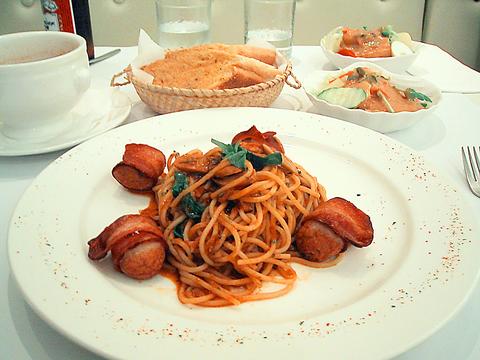You are wandering about Hsimenting, singing at Cashbox, catching a movie, or just plain shopping, and you get hungry. You want a change of taste from the omnipresent food stands and pubs, and you are looking to relax.
Spicy ? of Life right across from the Matsu Temple on Chengtu Road is a great option. A three-story high spaghetti restaurant outshines the buildings on either side with silvered-framed windows.
Spicy ...of Life opened in October of last year, and is quickly becoming more popular and well known, especially among entertainers. Japanese star Takeda Shinji (

PHOTO: EMILY WU, TAIPEI TIMES
"Unlike ordinary spaghetti restaurants, our specialty lies in our secret home-made sauce," said Erick Lin (
Milan hock of beef with spaghetti is one of the fortes of Spicy ... of Life. The fresh meat is first fried until golden brown on the outside. Then the semi-raw beef is set to stew in the chef's sauce until the taste and flavor seeps into the meat. The result is a savory and tender beef on top of mouth-watering angel hair.
A South African customer who had spaghetti with bacon and sausage commented that "it was really great." The main attraction of this dish was the fried bacon wrapped around sausages. The noodles tasted of olives, basil, oregano and tomato base, another blend that Spicy ? of Life handles really well.
Its other ingenious dishes include ink spaghetti with crab meat, black pepper Philly meatball spaghetti, and the celebrated spicy beef spaghetti.
Inexpensive but appetizing, a full meal costs around NT$300, including soup and salad.
Spicy ... of Life is also distinguishable by its modern interior design, that sets up a contrast with the temple that it overlooks. The general impression is that it is part loft and part lounge. Most of its customers are young working people. It is not exactly the candle-light dinner one might be looking for on Valentines Day, but there is a definite character and energy. A smart move is to use it as a pre-party venue before moving out into Taipei's nightlife.
The service is efficient without being intrusive, the waiters and waitresses aren't bad looking either!
Spicy ... of Life is located at 46 Chengtu Road in Taipei (

On April 26, The Lancet published a letter from two doctors at Taichung-based China Medical University Hospital (CMUH) warning that “Taiwan’s Health Care System is on the Brink of Collapse.” The authors said that “Years of policy inaction and mismanagement of resources have led to the National Health Insurance system operating under unsustainable conditions.” The pushback was immediate. Errors in the paper were quickly identified and publicized, to discredit the authors (the hospital apologized). CNA reported that CMUH said the letter described Taiwan in 2021 as having 62 nurses per 10,000 people, when the correct number was 78 nurses per 10,000

As we live longer, our risk of cognitive impairment is increasing. How can we delay the onset of symptoms? Do we have to give up every indulgence or can small changes make a difference? We asked neurologists for tips on how to keep our brains healthy for life. TAKE CARE OF YOUR HEALTH “All of the sensible things that apply to bodily health apply to brain health,” says Suzanne O’Sullivan, a consultant in neurology at the National Hospital for Neurology and Neurosurgery in London, and the author of The Age of Diagnosis. “When you’re 20, you can get away with absolute

When the South Vietnamese capital of Saigon fell to the North Vietnamese forces 50 years ago this week, it prompted a mass exodus of some 2 million people — hundreds of thousands fleeing perilously on small boats across open water to escape the communist regime. Many ultimately settled in Southern California’s Orange County in an area now known as “Little Saigon,” not far from Marine Corps Base Camp Pendleton, where the first refugees were airlifted upon reaching the US. The diaspora now also has significant populations in Virginia, Texas and Washington state, as well as in countries including France and Australia.

May 5 to May 11 What started out as friction between Taiwanese students at Taichung First High School and a Japanese head cook escalated dramatically over the first two weeks of May 1927. It began on April 30 when the cook’s wife knew that lotus starch used in that night’s dinner had rat feces in it, but failed to inform staff until the meal was already prepared. The students believed that her silence was intentional, and filed a complaint. The school’s Japanese administrators sided with the cook’s family, dismissing the students as troublemakers and clamping down on their freedoms — with